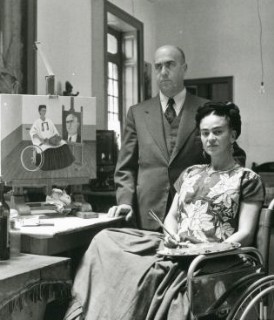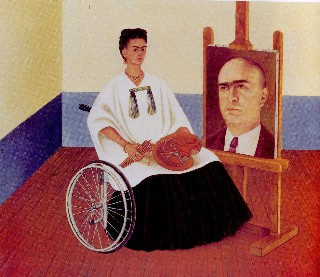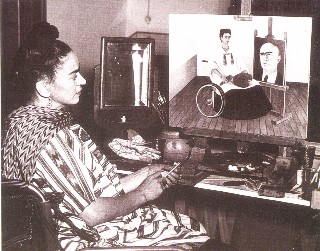Self-Portrait
with the
Portrait of Doctor Farill
1951
This painting is a portrait of Frida with her surgeon Doctor Juan Farill. This was her last signed self-portrait.
In 1951 Dr. Farill performed a series of 7 operations on Frida's spine. She remained in the hospital in Mexico City for 9 months. In November of that year Frida was finally well enough to paint. Her first painting was this self-portrait which she dedicated to Dr. Farill. "I was sick for a year….seven operations on my spine" she noted in her diary, and "Dr. Farill saved me". The fact that she gave Dr. Farill credit for saving her life may explain why this self-portrait is in the style of an "ex-voto (retablo)". In the painting Dr. Farill appears in place of the usual saint and Kahlo as the unfortunate victim who has been saved. Frida, confined to a wheelchair, paints from a heart shaped palette of her own blood….maybe her way of saying this painting is from her heart. The brushes she holds firmly in her hand look more like bloody surgical instruments.
Frida may have borrowed the idea for this painting from Goya, who, during his last years painted a 'retablo style" self-portrait entitled "Goya Attended by Doctor Arrieta". In that painting he included an inscription thanking the doctor for saving his life.

Dr.
Farill and Frida with Painting
Photo by Gisèle Freund 1951
Dr. Farill y Frida con la pintura
Foto por Gisèle Freund 1951

Oil
on masonite
16 ¼" x 19 ¾"
Gallery Arvil
Mexico City
Óleo sobre fibra dura
41,5 x 50 cm.
Galería
Arvil
Ciudad de México
Autorretrato con
el
retrato del Dr. Farill
1951
Este cuadro es un retrato de Frida con su cirujano, el doctor Juan Farill. Éste fue su último autorretrato firmado.
En 1951, el Dr. Farill llevo a cabo una serie de siete operaciones en la columna vertebral de Frida. Frida permaneció internada en el hospital en la ciudad de México durante nueve meses. En Noviembre de ese año, Frida por fin se encontró suficientemente bien para pintar. Su primer cuadro fue este autorretrato dedicado al Dr. Farill. "Estuve enferma durante un año….siete operaciones en mi columna vertebral" escribió en su diario y "el doctor Farill me salvó". El hecho de que ella le dio crédito al Dr. Farill por salvar su vida, podría explicar porqué este autorretrato fue hecho como un "ex-voto (retablo)". En el pintura, el Dr. Farill aparece en el lugar que normalmente ocupa un santo, y Kahlo aparece como la desgraciada victima que ha sido salvada. Frida, confinada a una silla de ruedas, pinta con su propia sangre usando su corazón como una paleta…quizás fue su manera de decir que pintaba el retrato desde el fondo de su corazón. Los pinceles que sostiene firmemente en su mano parecen más sangrientos instrumentos quirúrgicos.
Frida pudo haber tomado la idea para esta pintura de Goya, que, en sus últimos años pintó un "retablo de estilo" autorretrato titulado: "Goya atendido por el Doctor Arrieta". En el cuadro, incluyó una inscripción agradeciendo al doctor que salvara su vida.
